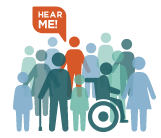February is Black History Month ✨
We honor and celebrate the central role that African Americans have had and continue to have in the United States.
For the RRTC project specifically, it is important that African American’s voices are heard and listened to when it comes to their overall health and mental health, especially those with intellectual disabilities (ID). Learning about experiences and new ways to incorporate accessibility with a sensitivity to culture brings value to our healthcare system, as well as to the communities we serve.
This month, we are highlighting some recent literature published by one of our REEP members, Mirian E. Ofonedu, who discusses a model to increase mental healthcare equity in black youth of African descent. Following this model gives our group the potential to reach out to a larger community of people with ID while maintaining cultural sensitivity.
https://doi.org/10.1080/23794925.2023.2169969

Abstract: For Black youth of African descent and their families, the pathways to effective support and intervention
for mental health are complex and challenging to navigate. Research continues to highlight the
need to achieve health equity, eliminate disparities, and improve mental health access and care of all
groups. Thus, there is a need for strategies that are culturally responsive for promoting positive mental
health outcomes for Black youth of African descent. In this paper, a new perspective that promotes
access to non-stigmatizing, culturally responsive supports for Black youth of African descent across all
socio-economic status is presented. This innovative framework for culturally responsive treatment
engagement is called the Family as Host (FAH) model. This model positions Black youth and their
family as primary initiators, acting as “Host” and clinical care providers as facilitators, acting as “Guest”
during treatment engagement. Implications for practice and research are discussed to promote
positive psychological health outcomes for Black youth of African descent.

